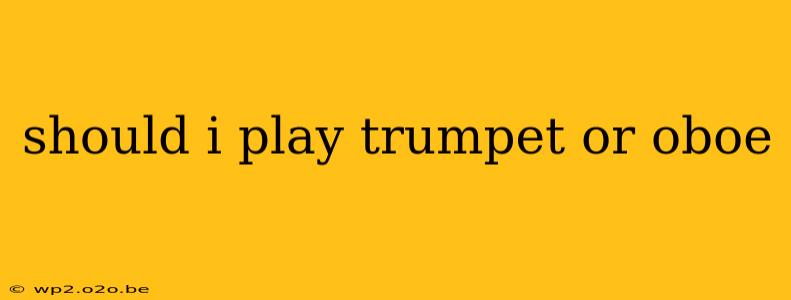Trumpet or Oboe: Which Instrument Should You Play?
Choosing your first (or next!) instrument is a big decision! The trumpet and oboe are both beautiful and expressive instruments, but they offer vastly different playing experiences. This guide will help you weigh the pros and cons of each to make the best choice for you.
Trumpet: The Bold and Brassy Choice
The trumpet, a member of the brass family, is known for its bright, powerful sound. It's often associated with jazz, classical music, and marching bands, showcasing its versatility across genres.
Pros:
- Relatively Easy to Learn Basics: Producing a sound on the trumpet is generally easier than on the oboe. The initial fingerings are simpler, allowing for quicker progress in learning basic melodies.
- Wide Range of Dynamics: From delicate pianissimos to powerful fortissimos, the trumpet offers a wide dynamic range, allowing for expressive playing.
- Popularity and Resources: The trumpet is a very popular instrument, meaning there's a wealth of readily available resources, teachers, and sheet music.
- Social Aspect: Trumpets are often found in bands and ensembles, providing opportunities for social interaction and collaborative music-making.
Cons:
- Physical Demands: Playing the trumpet requires good breath control and embouchure (mouth muscles). Developing a strong embouchure takes time and practice, and can sometimes lead to fatigue or soreness.
- Maintenance: Valves need regular cleaning and lubrication to ensure smooth operation.
- Loud Sound: The trumpet’s loud sound can be unsuitable for practice in smaller apartments or shared spaces.
Oboe: The Graceful and Reedy Instrument
The oboe, a double reed instrument in the woodwind family, is known for its expressive, mellow tone. Its distinctive sound is often featured in orchestral and chamber music.
Pros:
- Unique and Expressive Sound: The oboe possesses a beautiful, haunting timbre that sets it apart from other instruments. It's capable of producing a wide range of emotions.
- Subtle Nuances: The oboe allows for incredibly subtle nuances in tone and phrasing. Experienced players can coax a wide palette of sounds from the instrument.
- Intellectual Challenge: Mastering the oboe requires significant dedication and precision. The double reed itself requires specific maintenance and skill to play effectively. This challenge can be rewarding for dedicated musicians.
Cons:
- Difficult to Learn: The oboe is notoriously difficult to learn, particularly mastering the reed and achieving a consistent tone. Initial progress might be slower compared to the trumpet.
- Reed Maintenance: The oboe reed requires constant care and adjustment. This can be time-consuming and frustrating for beginners.
- Less Common: Oboes are less common than trumpets, which might make finding teachers, repair shops, and specific sheet music slightly more challenging.
Which Instrument is Right for You?
Consider these questions to help you decide:
- Do you prefer a brighter, louder sound or a softer, more mellow tone?
- How much time and effort are you willing to dedicate to practice and instrument maintenance?
- What kind of music are you most interested in playing?
- Are you comfortable with a physical challenge (trumpet) or an intellectual challenge (oboe)?
Ultimately, the best way to decide is to try both instruments! Many music schools and instrument shops offer introductory lessons or trial periods. This hands-on experience will give you the best insight into which instrument feels right for you. Don't be afraid to explore and find the instrument that sparks your passion.

